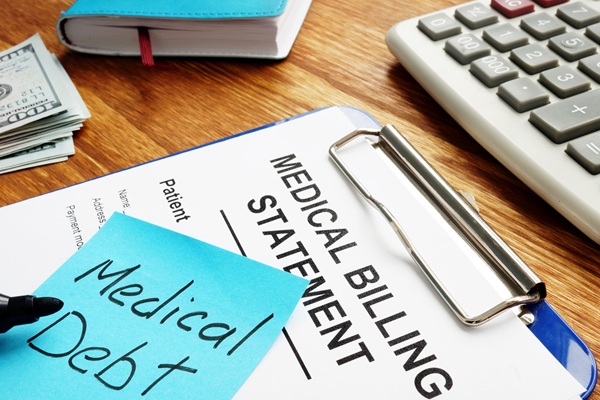
How Chapter 7 or Chapter 13 can help you move forward
Going to the doctor shouldn’t be financially ruinous, but unfortunately, for too many Americans, that’s exactly what happens. By some estimates, Americans owe as much as $220 billion in medical debt. And perhaps unsurprisingly, medical debt is one of the leading causes of personal bankruptcy.
So, can you get medical debt cleared in bankruptcy? The short answer is yes, though it depends on your overall financial situation and what type of bankruptcy you qualify to file for. Here’s what you need to know.
Medical debt is generally dischargeable in bankruptcy
Certain types of debt are tough to discharge (eliminate) in bankruptcy, but medical debt generally isn’t one of them. Under the bankruptcy code, you can only discharge personal debt, not business debt—but since medical debt is almost always personal in nature, that is rarely if ever a problem.
Furthermore, it’s a type of unsecured debt, meaning there isn’t an asset (like a house or a car) tied to the debt. Thus, absent any special circumstances (such as fraud), medical debt is generally dischargeable in bankruptcy.
What that means is if you qualify for Chapter 7 bankruptcy, based on the means test, you can usually get your medical debt discharged in its entirety. Chapter 7 is a quick, relatively straightforward process, usually completed in four to six months. However, it’s not available if your income is too high to qualify, and it’s not the best option for many people with secured debts such as mortgages or auto loans.
What if you aren't eligible for Chapter 7 bankruptcy?
If you don’t qualify for Chapter 7, or if you have other debts that would make it inadvisable to file for Chapter 7, then Chapter 13 bankruptcy can also help with medical debt. In Chapter 13, your debts are rolled into a repayment plan with an affordable monthly payment for three to five years. Once you complete the repayment plan, remaining debts, including medical debt, are discharged.
Either way, bankruptcy can provide you with a fresh start and a way out of your medical debt and any other debts you may have. Remember, it’s not your fault you got sick or injured. You have legal options, and we can help you find your path forward.
Talk to an experienced bankruptcy attorney today
While medical debt is usually one of the easier types of debt to discharge in bankruptcy, that doesn’t mean you can afford to go it alone. Only an attorney can review your overall financial situation, including your medical debt as well as other debts, income, assets, family size, and so on, and explain whether it’s in your interest to file for Chapter 7 or Chapter 13 bankruptcy.
An attorney can also advise whether it makes sense to file for bankruptcy now or wait for a change of circumstances—for instance, if you are currently undergoing treatment and accumulating more medical bills, it may make sense to wait until your condition stabilizes.
Furthermore, an experienced bankruptcy lawyer can guide you through the process and put you in the best position to get the financial reset you need.
If you’re dealing with overwhelming medical debt or facing collection action, it may be time for a financial reset. Give us a call or contact us online for a free, confidential consultation with Benjamin R. Matthews & Associates, LLC.
"Once they started my case, it was less than a week before my creditors stopped with the harassing calls and emails. Everything after that went fairly smooth. I’m very satisfied with the experience." – Martin R., ⭐⭐⭐⭐⭐
